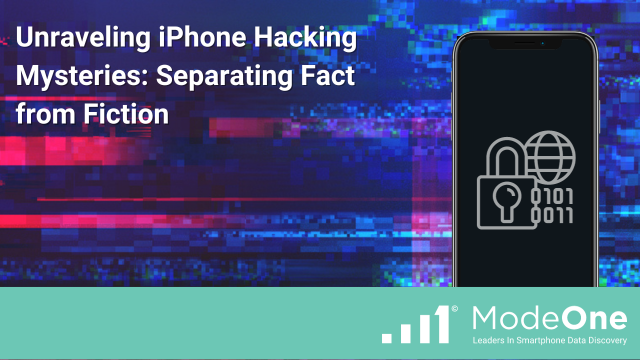In a world of increasing smartphone usage for personal and business activities, concerns regarding the privacy and security of personal data have soared to unprecedented levels. Many individuals are concerned that their iPhones have been hacked – a fear often spurred by receipt of unexpected text messages, perceived sluggishness in device performance, or reports from contacts receiving messages allegedly sent by an iPhone user, but which the user doesn’t recall sending.
In this blog, we’ll dissect the common misconceptions surrounding iPhone security and provide actionable steps to ensure that your data remains protected.
Is Your iPhone Really Compromised?
Before you jump to conclusions about your iPhone’s security being diminished, it’s essential to distinguish between the myths and the realities of iPhone hacking. Receiving unsolicited text messages that contain personal information, or discovering unfamiliar data on your device can indeed be unsettling. However, most of these scenarios are not indicative of a malware or spyware attack.
It is important to note that technology capable of hacking Apple mobile devices is generally deployed by state-sponsored entities and not average hackers. Apple continually fortifies its defense against such sophisticated attacks by routinely releasing security updates and patches, thereby quickly plugging known vulnerabilities. Keeping your device updated with the latest software essentially keeps it guarded against such high-level threats.
The Likely Culprits
Most often the origins of perceived “hacking” activities are closer to home. Issues often stem from someone closely related to a unique situation or another participant involved in it. Let’s go deeper into understanding how you can safeguard your account, data, and privacy from such inadvertent exposures:
1. Secure Your Cell Provider Account
Start with securing the access to your cell provider account by:
-
- Updating your password frequently to a stronger, unique alternative.
- Enabling two-factor authentication to add an extra layer of security.
- Reviewing and removing any unnecessary managers or co-owners from your account, thus restricting access to essential users.
2. Strengthen Your Apple ID and iCloud Credentials
Fortify your iCloud and Apple ID account by:
-
- Updating the passwords for both your iCloud and Apple ID accounts. Note that these can be different; the iCloud account is what you use to log into your phone, while the Apple ID is used for app store purchases.
- Activating two-factor authentication to ensure only you can access your accounts, even if someone else knows your password.
3. Monitor Device Activity Through Apple ID
Regularly check the devices linked to your Apple ID by:
-
- Visiting appleid.apple.com and selecting “Devices” on the left panel.
- Documenting the devices displayed and promptly removing any unfamiliar devices.
4. Review Parental Control Apps
If you use parental control apps like Life360 or iCloud Family:
-
- Ensure your device is not being monitored or controlled inadvertently.
- Review configurations regularly to maintain desired privacy settings, keeping the focus on monitoring the intended devices only.
5. Security Devices or Systems
-
- Verify your security devices/systems are protected from monitoring by an unauthorized party.
- Confirm your access and change your passwords regularly to ensure others are unable to view security camera video feeds or listen to related audio recordings.
Conclusion
In an age of proliferating digital connectivity and communication, securing your personal data should be a top priority. While fears of iPhone hacking are generally based on misconceptions, staying vigilant and taking the necessary preventive steps to lock down your accounts will go a long way towards protecting your privacy.
Please be certain to share these insights with your network, encouraging a culture of data safety and smart iPhone usage. Remember, a well-protected iPhone is your first line of defense against unwarranted access and privacy invasion.
